
Chones / shutterstock.com
CHICAGO—At the 2018 ACR/ARHP Annual Meeting in October, the ACR and the ARHP honored a group of distinguished individuals who have made significant contributions to rheumatology research, education and patient care. This month, The Rheumatologist speaks with the winners of the ARHP Merit Awards about their individual contributions to advancing rheumatology. You’ll also find interviews with the Distinguished Fellow Award recipients.
ARHP MERIT AWARDS
ARHP Masters
Two distinguished members received the ARHP Master designation in 2018: Charles G. Helmick, MD, and Carol A. Oatis, PT, PhD.
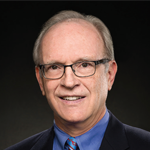 Dr. Helmick, a medical epidemiologist in the Arthritis Program for the Centers for Disease Control and Prevention (CDC) in Atlanta, was named a Master in 2018.
Dr. Helmick, a medical epidemiologist in the Arthritis Program for the Centers for Disease Control and Prevention (CDC) in Atlanta, was named a Master in 2018.
“The ARHP has provided a welcoming home for those of us working in public health and is our go-to meeting for the field of arthritis public health,” says Dr. Helmick. “All of us share a goal in treating the whole person in whatever ways work best.”
When his effort to address aging-related problems got little traction at the CDC in the early 1990s, Dr. Helmick switched his focus to the most “sellable” of those public health problems—arthritis. Working with the ARHP and its former president, Teresa Brady, along with the ACR, Arthritis Foundation and other partners, he helped develop the National Arthritis Action Plan—A Public Health Strategy, published in 1999. This document provided support for Congress’ first funding for the CDC’s Arthritis Program that same year.
Since then, the program has provided measures on all levels—national, state and county—regarding the public health impact of arthritis and other rheumatic conditions. Likewise, it has developed and promoted evidence-based, but underused, interventions, such as self-management education and physical activity. These community interventions in 12 CDC-funded state health departments have reached more than 200,000 adults over the past six years.
Dr. Helmick earned his medical degree from Johns Hopkins School of Medicine in 1976. After training in internal medicine between 1976 and 1979 at Baltimore City Hospital, he joined the Epidemic Intelligence Service in 1979—the CDC’s disease detective training program—where he worked on exotic infectious diseases in international settings before switching his focus to chronic diseases as the bigger health problems.
From 1997 to 2009, he learned about rheumatic diseases firsthand while working part time in the Atlanta VA Rheumatology Clinic. In 2009, he retired as a captain in the U.S. Public Health Service, but still works today as a civil servant in the CDC Arthritis Program.
An ARHP member since the mid-1990s, Dr. Helmick is a long-time contributor to Arthritis Care & Research and has served on the journal’s Editorial Board. Over the years, he has worked with other members to build ARHP’s reputation as the national home for public health science and intervention activities that address arthritis and other rheumatic conditions.
“The ARHP is the perfect place to work on bridging the clinical-community gap in health and to achieve what we all want: better health and quality of life for people affected by arthritis and other rheumatic conditions,” he says.
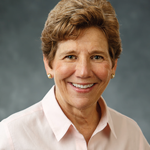 Dr. Oatis is a professor in the Department of Physical Therapy at Arcadia University, Glenside, Pa. “The ARHP introduced me to extraordinary researchers, leaders and other health professionals who were leaders in rheumatology care and research,” she says. “These people became my mentors and supporters, and really paved the way for me into ARHP leadership.”
Dr. Oatis is a professor in the Department of Physical Therapy at Arcadia University, Glenside, Pa. “The ARHP introduced me to extraordinary researchers, leaders and other health professionals who were leaders in rheumatology care and research,” she says. “These people became my mentors and supporters, and really paved the way for me into ARHP leadership.”
As past president of the ARHP, Dr. Oatis is an active researcher whose projects have crossed disciplines, ranging from basic biomechanics and health services research to physical therapy (PT) practice patterns.
Currently, she is collaborating with Patricia D. Franklin, MD, MBA, MPH, professor of orthopedics and physical rehabilitation at the University of Massachusetts Medical School, Worcester, on a project that examines and assesses the effects of PT practice variation in patients following total knee replacement surgery.
For the past 40 years, Dr. Oatis has taught kinesiology and biomechanics to physical therapy students at two Pennsylvania universities. While completing her PhD at the University of Pennsylvania, Philadelphia, she also served on its faculty during the late 1970s. After the university closed its PT program, she taught PT part time at Arcadia University, Glenside. Around the same time, she and her former university colleagues also formed a PT practice. After 14 years, that practice closed, and Dr. Oatis became a full-time professor at Arcadia in 1991.
While teaching and delivering patient care, she has focused on musculoskeletal conditions, including arthritis, mainly due to her interest in biomechanics and functional anatomy or kinesiology.
During her academic career, she has supervised independent student research and mentored dozens of students. At least 40 have participated in rheumatology-related research. Some even accompanied her to ACR/ARHP Annual Meetings to present their findings and are now practicing clinicians, researchers and scholars. She believes their exposure to the ARHP provided them with a broader perspective on rheumatology and interprofessional care.
As an active member of the ACR/ARHP for more than 25 years, Dr. Oatis has served on committees and review panels and led the ARHP as its president in 2005.
This year, she reduced her academic workload. While still mentoring students, she now teaches PT part time so she can focus more on research.
“In the coming years, I’ll continue my research looking at PT practice and its effects on outcomes with people with total knee replacements,” Dr. Oatis says. “Hopefully, our team’s work will contribute to a description of best practice for PT following total knee replacement and for patients with arthritis in general.”
Lifetime Achievement Winners
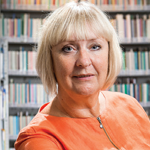 Christina H. Opava, PhD, RPT, is one of two recipients of the 2018 ARHP Lifetime Achievement Award. “Receiving this award is an immense honor,” she tells The Rheumatologist. “My first thought was that there are so many others who deserve it, but I have to forget that and just be happy that my work is being recognized. It’s a real joy.”
Christina H. Opava, PhD, RPT, is one of two recipients of the 2018 ARHP Lifetime Achievement Award. “Receiving this award is an immense honor,” she tells The Rheumatologist. “My first thought was that there are so many others who deserve it, but I have to forget that and just be happy that my work is being recognized. It’s a real joy.”
The highest honor the ARHP bestows, the Lifetime Achievement Award is presented to a current or former member of ARHP whose career has demonstrated a sustained and lasting contribution to the field of rheumatology and rheumatology health professionals.
Dr. Opava graduated as a physical therapist from Lund University in 1978 and then held clinical physical therapist positions until 1993, when she earned her PhD from Karolinska Institute. She has since been employed at the Department/Division of Physical Therapy, Karolinska Institute, where she became an associate professor in 1999 and a full professor in 2006. Her academic position is joined with one at the Rheumatology Clinic, Karolinska University Hospital. She is the current director of the Strategic Research Area Health Care Science at Karolinska Institute and Umeå University.
Dr. Opava formed her research team focusing on physical activity and health in rheumatic disease in 1999. One important aspect of her work is the development, evaluation and implementation of clinical trials of exercise and physical activity interventions. She has been a pioneer in testing various models of exercise delivery, from one-on-one counseling to Internet-based interventions using efficacy and effectiveness study designs. Dr. Opava’s publication record lists more than 100 scientific publications, including peer-reviewed original and review papers, short reports and textbook chapters, the majority with her as the first or senior author.
Dr. Opava has been an ARHP member since 1993, joining shortly after attending her first ACR/ARHP Annual Scientific Meeting in Atlanta in 1992, when she was a fourth-year PhD student. At that first meeting, she started building a network of colleagues and friends that inspired her and became the impetus for her to remain an engaged member all these years later. She was invited to the President’s Reception. And she remembers visiting the Coca-Cola Museum with her new American friends. She credits her membership in the ARHP with helping her create a “really good network of American colleagues. I’ve made great colleagues, great friends.”
Those friendships have kept her coming back to the Annual Meeting about every other year. She says, “We talk about research, teaching, clinics and our families. Many have visited Stockholm, and know my husband and my two sons. We’ve had a lot of fun over the years.”
In the early 1990s, the ARHP was the only organization that was reaching out to rheumatology health professionals. Today, EULAR devotes a vice president position to a health professional, a position Dr. Opava filled from 2013–2017. During that time she initiated the first formal collaboration between EULAR health professionals and ARHP on recommendations for the health professional’s approach to pain management in arthritis.
Dr. Opava received the ARHP Distinguished Scholar Award in 2002 and the Ann Kunkel Advocacy Award in 2016, both milestones in her career.
Dr. Opava says membership in the ARHP taught her how to socialize with people from other countries. “It gave me confidence in that skill.”
Dr. Opava has supervised 11 PhD students to graduation and has performed extensive teaching at all levels at 15 universities in Sweden and other European countries, in America and in Asia. “Christina is inspiring and knowledgeable. She is the guru,” says Helene Alexanderson, RPT, associate professor, Karolinska Institute, Sweden, and a former student of Dr. Opava. “She is one of the three people I have as a role model,” Dr. Alexanderson continues.
So what’s next for Dr. Opava? She’s helping plan a new series of studies that will focus on pain and lifestyle, including physical activity and diet. “Lifestyle has become an increasingly important focus for research,” she says. The plan is to start with qualitative interviews, then move on to registry-based studies and finally interventional studies. She’s working with a former PhD student to whom she plans to hand off the reins when she retires next year.
“I’ve done my part,” says Dr. Opava. “It’s time I give it over to the next generation.”
Dr. Opava is looking forward to focusing on interests and priorities outside work, such as livening up her exercise routine with bicycling and dancing. She may also move out of Stockholm and back to the southern edge of Sweden where she grew up.
She hopes people will remember that “I am a good person. Research is important, but being a good person is more important.” She pauses for a moment and says, “I hope they remember that I was fun, too.”
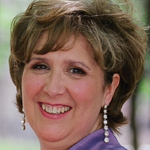 Janalee Taylor, MSN, APRN, CNS, CPNP, was also honored with a 2018 ARHP Lifetime Achievement Award. Ms. Taylor is an affiliate faculty member and co-director of quality improvement in the Division of Rheumatology at Cincinnati Children’s Hospital Medical Center (Cincinnati Children’s).
Janalee Taylor, MSN, APRN, CNS, CPNP, was also honored with a 2018 ARHP Lifetime Achievement Award. Ms. Taylor is an affiliate faculty member and co-director of quality improvement in the Division of Rheumatology at Cincinnati Children’s Hospital Medical Center (Cincinnati Children’s).
“The ARHP has served as a cornerstone of my education in pediatric rheumatology,” says Ms. Taylor. “Through collaboration and networking, the friendships I’ve developed will stay with me forever. It’s an awesome organization.”
Ms. Taylor is a veteran in the field of pediatric rheumatology. Her 38-year career has been filled with accomplishments. She provided nursing care to the first pediatric patient to receive a biologic and was the first allied health professional representative to serve on the Advisory Council of the Pediatric Rheumatology Collaborative Study Group. She held that role for 10 years. She served as Cincinnati Children’s Division of Rheumatology interim clinical director for two years and associate clinical director for 16 years. With numerous publication credits, she also co-authored an evidence-based guideline for self-management in pediatric chronic disease.
She began her career in 1978 at Riley Hospital for Children at Indiana University Health, Indianapolis. In 1986, she obtained her first master’s degree (MSN) from Indiana University, Bloomington, and two years later, began working at Cincinnati Children’s in the Division of Rheumatology where she held numerous roles, ranging from affiliate faculty and nurse practitioner to co-leader of quality improvement. In 2006, she received her second master’s degree (CPNP) from University of Cincinnati School of Nursing.
As an active ARHP member since 1981, she has served on many of its committees, including Quality of Care, Advocacy, Practice, and Membership and Nominations. She has been a speaker and moderator at numerous Annual Meetings, served on the task force for the Development of Standards of Practice, co-chaired two national pediatric rheumatology conferences and authored modules for ARHP’s Advanced Rheumatology Course. In 2011, she was also a member of an international task force that focused on the initiation and safety monitoring of therapeutic agents for the treatment of JIA and systemic features.
Throughout her career, her work has been highly praised. She is the past recipient of the ARHP’s Addie Thomas Service Award, Ann Kunkel Advocacy Award and Charles B. Harding Award for volunteer service. Currently, she volunteers extensively with the Arthritis Foundation, serving on its Executive Committee, Board of Directors and many national committees, including the Missions Measure Task Team, Awards Review, JA Alliance, Research Task Force, Charter and Performance and Strategic Directions.
“I’m highly engaged in quality improvement, both locally and nationally,” says Ms. Taylor. “There are about 18 different centers that use quality improvement methods to improve JIA. We’re going to focus on treat to target as they’ve done with adults, targeting medication to get the disease in remission or have low disease activity.”
Ann Kunkel Advocacy Award
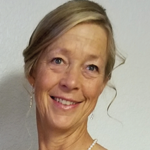 Named in named in honor of ARHP member Ann Kunkel, a patient educator in pediatric rheumatology whose enthusiasm and persistence has inspired many members to join the effort to increase arthritis awareness, this year’s award went to Lisa Robbins, BSN, RN, CPN, clinical care manager at PennState Health, Hershey, Pa.
Named in named in honor of ARHP member Ann Kunkel, a patient educator in pediatric rheumatology whose enthusiasm and persistence has inspired many members to join the effort to increase arthritis awareness, this year’s award went to Lisa Robbins, BSN, RN, CPN, clinical care manager at PennState Health, Hershey, Pa.
“Pediatric rheumatology nurses are far and few between,” says Ms. Robbins. “For many years, the ARHP was the only, and certainly the most reliable, source of outcomes-based information specific for us. Participating in ARHP activities has supplied the bulk of my formal pediatric rheumatology education and networking with peers is invaluable.”
Ms. Robbins graduated from Cedar Crest College, Allentown, Pa., in 1986 with a Bachelor of Science in nursing. For the past 27 years, she has worked at PennState Health. Initially, she served as the clinical head nurse in Pediatric Intermediate Care and then in 1995, moved to Pediatric Rheumatology, where she is now the clinical care coordinator. Throughout the years, she has watched the practice grow from one pediatric rheumatologist and nurse to six pediatric rheumatologists, a nurse practitioner, two fellows and four nurses.
For the past 21 years, she has been an active ARHP member and served in a variety of different roles at the association’s meetings—session moderator, networking table leader and poster, panel and podium presenter, and abstract reviewer. She previously served on the Pediatric Rheumatology Collaborative Study Group.
She has completed the pediatric and adult modules of the ARHP’s Advanced Rheumatology Course, which mostly targets nurse practitioners and physician assistants. It includes 19 modules on topics ranging from medications to radiology and physical exams. At the time, she says it was the only “benchmark” course that helped her assess her level of knowledge against others in the field.
She also takes advantage of the ARHP’s nurse listserv to conduct minor research surveys and collaborate with member nurses about patient care, drug or treatment side effects, insurance authorizations and other issues related to patient care. Recently, she was nominated to serve on the ACR’s Government Affairs Committee, which supports a long agenda that includes advocating for patient care to members of Congress, soliciting government research dollars and pushing for insurance coverage of new or existing treatments and medications.
What makes this award so unique for Ms. Robbins is that she has known Ann Kunkel for many years, is very familiar with her work and deeply respects her contribution to rheumatology.
“Years ago, I worked at many Arthritis Foundation activities together with Ann Kunkel,” says Ms. Robbins. “My endeavors embody her spirit to advocate for patients and their families. Knowing her and her passion to help families [cope with] arthritis makes this award that much more gratifying.”
Distinguished Scholar
 Debbie Ehrmann-Feldman, PT, MSc, PhD, received the 2018 Distinguished Scholar Award. Dr. Ehrmann-Feldman is a professor in the School of Rehabilitation and on the medicine faculty in the Department of Social and Preventive Medicine and School of Public Health at the University of Montreal, Canada. She is also a researcher in the Centre for Interdisciplinary Research in Rehabilitation and Institute for Public Health Research at the University of Montreal.
Debbie Ehrmann-Feldman, PT, MSc, PhD, received the 2018 Distinguished Scholar Award. Dr. Ehrmann-Feldman is a professor in the School of Rehabilitation and on the medicine faculty in the Department of Social and Preventive Medicine and School of Public Health at the University of Montreal, Canada. She is also a researcher in the Centre for Interdisciplinary Research in Rehabilitation and Institute for Public Health Research at the University of Montreal.
“I’m really honored to be in the company of others who have won this or similar awards,” says Dr. Ehrmann-Feldman. “I’m happy that there’s recognition of my work and that people feel it is valuable.”
Over the past 40 years, Dr. Ehrmann-Feldman has made numerous contributions to the field of medicine, specifically in the areas of pediatric and adult rheumatology, musculoskeletal disorders, inflammatory arthritis, osteoarthritis, chronic pain, low back pain, organization of care, ethical and clinical issues in rehabilitation, knowledge translation and advocacy. Her long list of accomplishments includes 220 peer reviewed abstracts, more than 160 peer-reviewed manuscripts, and numerous scholarships and career awards from the Canadian Institute of Health Research, Arthritis Society of Canada, Canadian Arthritis Network and the Research Foundation of Quebec for Health Research.
After earning her MSc degree in 1984 from McGill University, Montreal, Dr. Ehrmann-Feldman took nine years off to raise her family while working part time as a physical therapist, research assistant and instructor at the same university. Then, between 1993 and 1998, she returned to McGill as a student to complete her PhD in epidemiology and biostatistics.
Two years later, she joined the faculty at the University of Montreal as an assistant professor, climbed the ranks and became a full professor in 2011 while also serving as the director of graduate studies in rehabilitation sciences until 2017.
Throughout her career, she has mentored more than 60 students, explored ethical dimensions related to access to physiotherapy and focused on issues related to third party payers and potential conflicts of interest, physical therapy management of patients with chronic musculoskeletal pain, promotion of physical activity in children and youth with juvenile idiopathic arthritis (JIA) and investigated birth outcomes in women who had JIA.
Currently, she’s researching direct referral of patients with suspected inflammatory arthritis by physical therapists to rheumatologists, conducting health services research in musculoskeletal disease and arthritis and investigating both access to care in rehabilitation and optimal ways of prioritizing care for patients with chronic musculoskeletal problems and arthritis.
While a member of the ARHP for the past decade, she sat on the Research Committee of the Arthritis Alliance of Canada and previously served on the Advisory Board of the Institute of Musculoskeletal Health and Arthritis of the Canadian Institutes of Health Research, where she still co-chairs its Research Ambassador Knowledge Translation Committee.
“I have some research projects up my sleeve,” says Dr. Ehrmann-Feldman, pointing to one that involves the association between oral health and JIA. “I’ve had quite a long career and plan to continue with my research.”
Distinguished Clinician
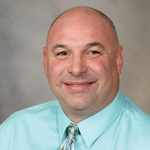 The recipient of the Distinguished Clinician Award is Daniel Schaffer, PA-C, MPAS, a clinical instructor in medicine in the Division of Rheumatology at the Mayo Clinic, Rochester, Minn.
The recipient of the Distinguished Clinician Award is Daniel Schaffer, PA-C, MPAS, a clinical instructor in medicine in the Division of Rheumatology at the Mayo Clinic, Rochester, Minn.
“The ARHP has been and still is a very critical and vital part of what I do every day with my colleagues and most importantly, my patients and their families,” says Mr. Schaffer. “Any success I may have attained in the practice of rheumatology is directly related to my ARHP membership—my training, friendships and professional networking opportunities.”
Mr. Schaffer’s military medical training and specialized rheumatology training he received at the Mayo Clinic proved to be invaluable when he was deployed to the Middle East from 2004–05 during Operations Iraqi Freedom and Noble Eagle. He cared for coalition soldiers and civilians of host nations with primary care and rheumatology conditions.
Mr. Schaffer, who retired as a major, spent 27 years in the U.S. Army Reserve. During his career, he completed a wide variety of training programs and courses, including basic and advanced courses for Army Medical Department officers.
His civilian career began as an emergency medical technician in 1985 in Spencer, Ind. Two years later, he received his certification as a paramedic from Bloomington Hospital, Ind., and worked in this role at the hospital until 1992. He completed his physician assistant training in 1994 at Cook County Hospital and Malcolm X College, Chicago. The following year, he entered primary care at the Unity Physicians Group, Bloomington, Ind., where he practiced until 1998. He then joined the primary care staff at Goshen Health in Indiana.
He continued his education, earning a master’s degree in 2000 with high honors and completing a fellowship in family medicine at the University of Nebraska, Lincoln. Then in 2001, he began his rheumatology career at the Mayo Clinic.
Mr. Schaeffer joined the ARHP around 2003 and has been active in multiple task forces, including those that developed the Advanced Rheumatology Course, Rheumatology Nursing course and the Nurse Practitioner/Physician Assistant Fellowship Program. He also sat on the ACR Blue Ribbon Task Force on Academic Medicine as ARHP’s representative. Currently, he’s serving on the association’s Practice Committee.
“My next goal is to complete my PhD at Trident University (an online, military university in Cypress, Calif.,) with my thesis looking at the treatment and study of rheumatoid nodules and how they might give us insight into molecular subtyping of rheumatoid arthritis,” Mr. Schaffer says. “I am also interested in studying the roles of bacterial and viral exposures and the immune system response as it relates to the pathogenesis of rheumatoid arthritis.”
Distinguished Educator
 The recipient of the 2018 Distinguished Educator Award is Jillian A. Rose, LCSW, MPH, the director of community engagement, diversity and research at the Hospital for Special Surgery (HSS), New York. “The ARHP was really the launching pad for me to look at some of the professional work being done in rheumatology around health education and public health and then model some of the HSS programs on what my colleagues and others were doing,” she says.
The recipient of the 2018 Distinguished Educator Award is Jillian A. Rose, LCSW, MPH, the director of community engagement, diversity and research at the Hospital for Special Surgery (HSS), New York. “The ARHP was really the launching pad for me to look at some of the professional work being done in rheumatology around health education and public health and then model some of the HSS programs on what my colleagues and others were doing,” she says.
As a director at HSS, Ms. Rose plays an integral role in the hospital’s community health needs assessment and community service plan. Her “case to cause” perspective helps her understand and address inequalities in rheumatology care through educational interventions that lead to patient partnerships and enhanced quality outcomes.
Since Ms. Rose was hired by HSS in 2005, she has supervised the Charla de Lupus (Lupus Chat) and LupusLine programs, nationally recognized peer support and educational outreach efforts for people with lupus and their families.
Her other responsibilities include developing and implementing hospitalwide training on working with multicultural populations; fostering an inclusive environment for the LGBTQ+ community; providing ongoing leadership and support for the collection of gender identity, sexual orientation, race, ethnicity and preferred language data; and identifying and addressing health disparities by developing tools and evaluation processes.
In 2005, Ms. Rose received her MSW degree from Columbia University, N.Y., and became a licensed social worker. A decade later, she earned her MPH degree from George Washington University, Washington, D.C.
Ms. Rose is a member of the Disparities Research Committee at HSS and was recently a co-investigator on a national study. She was the training research coordinator at nine hospital centers focused on engaging Latina and African-American women in examining their treatment options for knee osteoarthritis.
Previously, she has served as principal and co-investigator on many studies impacting rheumatology care. Among them is a qualitative analysis for the development of a lupus patient app or self-management tool and a patient-reported outcome tool.
Over the past 10 years, Ms. Rose has been a member of the ARHP and served on its Practice and Executive committees, as well as the ACR Communications and Marketing Committee, and, most recently, on the Collaborative Initiatives (COIN) department working group, a new program to advance health equity.
Meanwhile, she continues to share her knowledge at ACR/ARHP Annual Meetings and other international gatherings, such as EULAR, the Office of Minority Health’s Leadership Summit, the Movement Is Life Caucus on arthritis and musculoskeletal health disparities and conferences sponsored by the American Hospital Association and the Greater New York Hospital Association.
“My next challenge is integrating the patient perspective more authentically into clinician tools and doing it in a way that’s measurable, impactful, informative and will bring about change in our healthcare system,” Ms. Rose says.
Outstanding Students in Rheumatology
 The ARHP recognized two outstanding students in 2018: Danielle Rice, MSc, a PhD candidate at McGill University, Montreal, and Hiral Master, PT, MPTh, MPH, CPH, a PhD candidate at the University of Delaware, Newark.
The ARHP recognized two outstanding students in 2018: Danielle Rice, MSc, a PhD candidate at McGill University, Montreal, and Hiral Master, PT, MPTh, MPH, CPH, a PhD candidate at the University of Delaware, Newark.
“This award signifies that there’s an important role for rare diseases in the research world that will hopefully carry over to the clinical care patients receive,” says Ms. Rice. “This type of recognition provides additional motivation for me, the entire interdisciplinary team and the caregiver advisory committee for the growing impact of our work.”
As a recipient of a Vanier Canada Graduate Scholarship, which targets world-class doctoral students to study at Canadian universities, Ms. Rice provides psychotherapy in private clinics and tertiary hospitals in Montreal. As part of her doctoral dissertation, her research focuses on helping develop patient-centered interventions for individuals with scleroderma and their caregivers.
“Because of the rarity of the disorder, it’s something that doesn’t get a lot of attention or funding,” Ms. Rice says, referring to scleroderma as a burdensome disease. “Treatment options are directed toward the patient—as they should be—but then the family member is left out despite the fact that they’re very involved in the process. Caregivers go through turmoil from the time of diagnosis.”
While at McGill, Ms. Rice earned her Master of Science degree in 2015 and is on track to complete her PhD in clinical psychology in 2020.
Currently, she is developing interventions that involve caregivers throughout the entire treatment process, including those that can be implemented shortly after a diagnosis is made. She believes caregivers are an essential ingredient to patient care and must be involved upfront and during doctor appointments.
Her dream job would involve research and clinical and policy work. She says they all go hand in hand and can make impactful changes in understanding and treating scleroderma.
Meanwhile, she has volunteered for the ARHP Research Subcommittee. During her two-year term, she hopes to create additional learning opportunities, lead research sessions and plan online seminars that attract researchers and clinicians.
She says her research has taught her something valuable about herself: mainly, that she needed to expand her perspective by focusing not only on patients and their disease, but also on their caregivers.
She believes the ARHP will continue to be helpful to her ongoing learning. “I saw many learning opportunities [at the Annual Meeting] for every stage of my career that allow for ongoing engagement with international and national experts in various fields of rheumatology,” Ms. Rice says. “I look forward to many more years being a part of ARHP.”
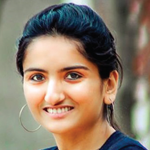 “Getting an award from an organization that I admire and follow means a lot to me,” says Ms. Master. “It affirms that my colleagues and eminent leaders in the field of rheumatology appreciate my work, which motivates me toward completing my PhD at the University of Delaware and ultimately, become an independent clinical scientist in rheumatology.”
“Getting an award from an organization that I admire and follow means a lot to me,” says Ms. Master. “It affirms that my colleagues and eminent leaders in the field of rheumatology appreciate my work, which motivates me toward completing my PhD at the University of Delaware and ultimately, become an independent clinical scientist in rheumatology.”
After obtaining her bachelor’s degree in 2011 from Seth G.S. Medical College in Mumbai, India, Ms. Master studied at Rajiv Gandhi University of Health Sciences, Mangalore, India, and earned a master’s degree in physical therapy in 2013. She continued her education in the U.S. at the University of North Texas Health Science Center, Fort Worth, where she received a Master of Public Health (biostatistics) in 2015. Her research focused on investigating physical functioning and health outcomes measures in adults with knee osteoarthritis.
This year, she received the University Doctoral Fellowship Award, which was sponsored by Unidel Foundation. Her interest in rheumatology, along with support from her school mentor—Daniel K. White, PT, ScD, MSc, assistant professor, Department of Physical Therapy—prompted her to join the ARHP as a student member and then volunteer in 2017 for the organization’s Annual Meeting Planning Committee. She has presented her research at national and international conferences.
“As a licensed physical therapist and a PhD student, I attended [the ACR/ARHP Annual Meeting] in 2016, not knowing anyone and not sure what to expect,” recalls Ms. Master. “I still went and met so many people with similar research interests and goals. I presented my research and got feedback from researchers whom I’ve always admired. I got so many things from the conference, much more than expected.”
Her long-term goal is to become an independent clinician-scientist in rheumatology with expertise in public health and physical therapy. Meanwhile, she reviews two peer-reviewed scientific journals and has a keen interest in mentoring emerging scientists, especially women scientists from developing countries who lack the academic and financial resources to evolve into the next generation of investigators. Currently, she is actively involved in organizing several university-level social and educational events.
As a millennial, she plans on integrating her love of technology with her research efforts to make research “more fun.”
“I’m really interested in using technology as digital detectors to investigate and identify underlying mechanisms of diseases, like osteoarthritis,” Ms. Master says.
DISTINGUISHED FELLOW AWARDS
The ACR’s Distinguished Fellow Award recognizes up to 10 clinical and research fellows who are in a rheumatology fellowship training program and who have performed meritoriously. In the following section, this year’s recipients talk about the award and their career paths.
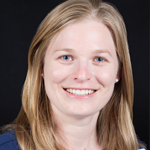 Brittany Adler, MD, an instructor in rheumatology at Johns Hopkins University, Baltimore, says, “This award is important because it’s a validation of a lot of years of hard work and dedication to my patients and trying to further advance rheumatologic research.”
Brittany Adler, MD, an instructor in rheumatology at Johns Hopkins University, Baltimore, says, “This award is important because it’s a validation of a lot of years of hard work and dedication to my patients and trying to further advance rheumatologic research.”
Dr. Adler is pursuing a rheumatology career as a translational physician-scientist. What she enjoys about conducting laboratory medical research is the ability to ask a question, design an experiment around it and then, hopefully, discover an effective treatment for her patients.
“Being a physician-scientist has taught me how important it is to persevere,” Dr. Adler says. “When you’re in the lab doing research, you can spend years working on a project and stumble on multiple roadblocks. It’s so important to keep going and when you fall, to get up again and try to find a path forward. It’s something I’m honing as I move forward in my career.”
After graduating medical school in 2012 from Case Western Reserve University, Cleveland, she completed her internship the following year and a residency in internal medicine in 2015, both at the Hospital of the University of Pennsylvania, Philadelphia. Three years later, she finished her clinical and research fellowship in rheumatology at Johns Hopkins University, Baltimore, and then joined the faculty.
Dr. Adler is now researching novel autoantibody discovery in scleroderma and myositis under the mentorship of Livia Casciola-Rosen, PhD, professor of medicine at the university, and Antony Rosen, MBChB, MD, the university’s vice dean for research; inHealth co-director; director, Division of Rheumatology; Mary Betty Stevens professor of medicine and professor of cell biology and pathology. She has discovered novel autoantibodies in myositis that may be important in disease pathogenesis, along with a novel autoantibody in scleroderma, and is characterizing the clinical phenotype of patients with this autoantibody.
Due to her interest in metabolomics, she is also working on an investigator-initiated clinical trial with Jemima Albayda, MD, an instructor in medicine, Division of Rheumatology, at the school, and Lisa Christopher-Stine, MD, MPH, associate professor of medicine at the university and director, Johns Hopkins Myositis Center. They are studying the effects of the insulin-sensitizing medication pioglitazone on mitochondrial function and strength in inclusion body myositis. She designed the trial and wrote the study protocol.
In the past two years, Dr. Adler received the T32 research training grant from Johns Hopkins and the Jerome L. Greene Scholar Award to support her translational research efforts.
In the near future, she hopes to spend a large portion of her time studying patients and is driven to “try to figure out cures, advancements and treatments,” she says, adding that the ACR provides her with a sense of community.
“This is such a great and humbling responsibility to take care of patients and help navigate them through their illnesses,” says Dr. Adler. “You are that patient’s point person, the one helping them for decades to cope and treat their illness.”
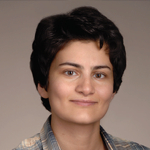 Sara Alehashemi, MD, MPH, is a rheumatologist at the National Institute of Allergies and Infectious Diseases (NIAID), Bethesda, Md. “I received a lot of mentoring from ACR members who helped me reach this stage of my career,” she says. “I’ve tried to reciprocate by being generous, by mentoring summer and post-baccalaureate medical students.”
Sara Alehashemi, MD, MPH, is a rheumatologist at the National Institute of Allergies and Infectious Diseases (NIAID), Bethesda, Md. “I received a lot of mentoring from ACR members who helped me reach this stage of my career,” she says. “I’ve tried to reciprocate by being generous, by mentoring summer and post-baccalaureate medical students.”
In 2008, Dr. Alehashemi moved to the U.S. from Iran, two years after earning her medical degree from Hormozgan University of Medical Sciences, Bandar-Abbas, Iran. She completed her internship in 2011 at Lincoln Hospital, N.Y., and residency training in 2013 at Pennsylvania Hospital, a teaching hospital affiliated with the University of Pennsylvania (UPenn), Philadelphia.
While at UPenn, she worked with Joshua Baker, MD, MSCE, assistant professor of Medicine at the hospital and also the Veteran’s Administration Medical Center, Philadelphia. After analyzing molecular imaging of musculoskeletal inflammation in rheumatoid arthritis, she completed a rheumatology fellowship in 2015 at the National Institute of Arthritis and Musculoskeletal and Skin Diseases (NIAMS).
While collaborating with Peter Grayson, MD, MSc, head of the Vasculitis Translational Research Program and associate director of the NIAMS Fellowship Program, Systemic Autoimmunity Branch, she helped incorporate advanced imaging techniques into the management of patients with large vessel vasculitis.
During her fellowship, she also obtained a Master of Public Health degree from Johns Hopkins University, Baltimore, specializing in epidemiology and data science. While training alongside Michael Ward, MD, MPH, chief of the Clinical Trials and Outcomes Branch, she focused on the epidemiology of cancer in ankylosing spondylitis and has since applied her data analysis skills in transcriptional profiling of monocytes in patients with monogenic autoinflammatory diseases. Then she joined the team of Raphaela Goldbach-Mansky, MD, MHS, chief of Translational Autoinflammatory Studies Unit, NIH.
Focused on becoming a translational physician-scientist, Dr. Alehashemi’s main interests target integrated analysis of high throughput data that provides insight into immune cells function. She started with proteomic analysis and transcriptional modeling of innate immune cells in patients with monogenic autoinflammatory diseases. Her goal was to obtain unique signatures of inflammatory pathways to help scientists unlock the mysteries of immune dysregulation and guide clinicians to improve treatment efficacy by specifically targeting the affected pathways while minimizing undesirable side effects.
Since 2016, Dr. Alehashemi has actively mentored research trainees and summer students at the NIH, organized board review sessions for rotating NIAMS medical students and coordinated a question and answer series for NIH clinical center nurses covering common manifestations of rheumatological diseases. In 2015, she received the Johns Hopkins MPH Dean’s Scholarship Award for public health training and in 2016, the D.C. Rheumatism Society Research Award for molecular imaging in large vessel vasculitis.
“In the future, I’d like to be a clinical investigator here at NIH and also follow the academic route by continuing to mentor or train others,” says Dr. Alehashemi.
 DeAnna A. Baker Frost, MD, PhD, is an assistant professor at the Medical University of South Carolina (MUSC), Charleston, S.C. She says, “It’s humbling to know that the hard work I put in for my fellowship and clinical and scientific areas has been recognized. It shows that others see potential in my future career.”
DeAnna A. Baker Frost, MD, PhD, is an assistant professor at the Medical University of South Carolina (MUSC), Charleston, S.C. She says, “It’s humbling to know that the hard work I put in for my fellowship and clinical and scientific areas has been recognized. It shows that others see potential in my future career.”
As a translational physician-scientist, Dr. Baker Frost is interested in defining the role of estradiol in systemic sclerosis (SSc). Her research with Carol Feghali-Bostwick, PhD, professor in the Department of Medicine at MUSC, Charleston, S.C., has led to the characterization of the relationship between estradiol and dermal fibrosis, and she is currently investigating the cell signaling mechanisms of her findings in vitro. She is also collaborating with Thomas Medsger Jr., MD, professor of medicine emeritus, Department of Medicine, Division of Rheumatology, University of Pittsburgh, to correlate disease characteristics and severity with serum estradiol levels in male SSc patients.
Dr. Baker Frost completed the Medical Scientist Training Program at MUSC, earning dual degrees—MD and PhD—in 2012. While working in the lab of Gary Gilkeson, MD, professor of medicine/microbiology and immunology and associate dean, faculty affairs and development at the university, she focused on the role of sphingolipids in a murine model of inflammatory arthritis, which partly inspired her to pursue a career in rheumatology. She then entered the American Board of Internal Medicine (ABIM) research pathway, where she completed her internal medicine residency at Duke University, Durham, N.C., and rheumatology clinical and research fellowships at MUSC.
During her last year of fellowship at MUSC, she was selected chief rheumatology fellow and awarded the T32 research training grant. Recently, she received the SCTR KL2 (K12) Multidisciplinary Scholars Program in Clinical & Translational Science mentored grant, also at MUSC. She now serves on the school’s Undergraduate Curriculum Committee for the College of Medicine, which creates innovative learning opportunities for the next generation of trainees, and on the admission committee for the university’s medical scientist training and internal medicine residency programs.
Dr. Baker Frost has been awarded first place in poster sessions throughout her fellowship at local scientific conferences. Her research has led to two poster presentations at ACR/ARHP Annual Meetings and two prepared first authored manuscripts.
While treating patients, she is passionate about empowering them through education. She recently taught a rheumatology small group for second-year medical students at MUSC and co-leads the Scleroderma Foundation’s Patient Support group in the Charleston Tri-County area with Richard Silver, MD, who led the school’s Division of Rheumatology & Immunology.
“I care about my patients to the point where I want to dedicate my life work to helping them feel better physically, mentally and emotionally,” says Dr. Baker Frost. “I enjoy seeing them in the clinic and taking care of them with therapies we currently have, but I yearn to help them feel better in the future by finding more targeted therapies for their disease.”
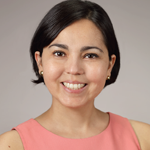 Marcela A. Ferrada, MD, a Rheumatology Clinical Fellow at the National Institute of Arthritis and Musculoskeletal and Skin Diseases (NIAMS), Bethesda, Md., says, “The ACR has been a platform for my goals and objectives to care for patients with relapsing polychondritis. When I proposed to do a study group last year, the ACR was very supportive.”
Marcela A. Ferrada, MD, a Rheumatology Clinical Fellow at the National Institute of Arthritis and Musculoskeletal and Skin Diseases (NIAMS), Bethesda, Md., says, “The ACR has been a platform for my goals and objectives to care for patients with relapsing polychondritis. When I proposed to do a study group last year, the ACR was very supportive.”
After receiving her medical degree in 2004 from the Universidad del Valle, Cali, Colombia, Dr. Ferrada moved to the U.S. to pursue an academic career. During the next decade, she attended the University of California, San Diego, as a post-doctoral fellow, completed her residency in internal medicine and chief residency at the University of Miami/Jackson Memorial Hospital, Florida, and pursued dual fellowships in critical care at the National Institutes of Health (NIH) and Infectious Diseases at Johns Hopkins, Baltimore.
In 2015, something unexpected happened. Dr. Ferrada was diagnosed with relapsing polychondritis (RP). Since then, she has devoted her career to better understanding the rare disease—more specifically focusing on how to generate better diagnostics, develop classification criteria and discover evidence-based treatments.
“Nobody has really studied RP until now,” says Dr. Ferrada, who is optimistic that her research will uncover effective treatments. “When you’re on the other side, the disease changes the way you practice as a physician.”
She refuses to let the disease interfere with her work. During her clinical fellowship at NIAMS, she conducted an international survey involving RP patients—later published in AC&R—to understand triggers, healthcare barriers and clinical presentations. To generate more awareness of RP, she also published her own story in and recorded a podcast for the Annals of the American Thoracic Society.
Dr. Ferrada is currently developing a clinical/translational research program in RP within the NIH Intramural Program, under the mentorship of NIAMS staff: James Katz, Rheumatology Fellowship program director, and Peter Grayson, MD, MSc, head of the Vasculitis Translational Research Program and associate director of the Adult Fellowship Program. Dr. Ferrada also created an international multidisciplinary working group to advance research in RP and has submitted a proposal to the ACR for funding and endorsement for the first RP classification criteria.
Dr. Ferrada is a tireless patient advocate. She volunteers as an instructor for Critical Care Simulation for NIH fellows and leads the Critical Care Medicine Shadowing program. Last year, she also served as the federal liaison for the RP Awareness and Support Foundation, giving more than 10 Grand Rounds presentations on RP at hospitals in the U.S.
Her efforts have earned her several awards, including the outstanding research award and poster award from the Rheumatism Society of the District of Columbia.
“Balancing this disease with work is very difficult,” says Dr. Ferrada. “Each day, regardless if I’m in pain, I do everything I can to achieve my goals.”
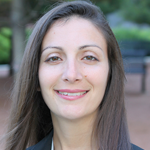 April M. Jorge, MD, a graduate assistant in medicine at Massachusetts General Hospital, Boston, and an instructor in medicine at Harvard Medical School, Boston, says, “The ACR has been a big part of my fellowship training. Its meetings have been a huge networking and learning experience. I’ve given presentations at its conferences. Moving forward, I hope to become more involved in its committees.”
April M. Jorge, MD, a graduate assistant in medicine at Massachusetts General Hospital, Boston, and an instructor in medicine at Harvard Medical School, Boston, says, “The ACR has been a big part of my fellowship training. Its meetings have been a huge networking and learning experience. I’ve given presentations at its conferences. Moving forward, I hope to become more involved in its committees.”
In 2012, Dr. Jorge graduated cum laude from Georgetown University School of Medicine, Washington, D.C., and was inducted into Alpha Omega Alpha Honor Medical Society. In 2015, she completed her internship and residency in internal medicine at McGaw Medical Center of Northwestern University, Chicago. While at Northwestern, Dr. Jorge completed the Women’s Health track and studied biliary disease in pregnancy as well as depression and cardiovascular disease in women with lupus. Then she returned to the East Coast and completed her Rheumatology Fellowship at Massachusetts General Hospital (MGH) in 2018.
Her long-term goal is to become an independent clinical investigator focused on systemic lupus erythematosus. During her fellowship, she began studying clinical outcomes and predictors of mortality among patients with SLE under the guidance of Hyon Choi, MD, director of clinical epidemiology in the Division of Rheumatology and Immunology at MGH. She is also mentored by Karen Costenbader, MD, MPH, rheumatologist, Brigham and Women’s Hospital, and professor of medicine, Harvard Medical School, Boston.
As a junior investigator, Dr. Jorge is interested in leveraging the electronic health record to study rheumatic diseases and recently developed an algorithm to accurately identify patients with SLE.
Dr. Jorge has extended her clinical knowledge and experiences to the classroom. She has taught multiple joint injection workshops, lectured on lupus and related conditions to internal medicine students as part of MGH’s Ambulatory Care curriculum and taught Harvard Medical School students in the Human Systems: Rheumatology course and Practice of Medicine Musculoskeletal Exam workshop. She is also a recurring speaker at MGH’s Maxwell and Eleanor Blum Patient and Family Learning Center and gives talks for the general public on understanding lupus and osteoarthritis.
During her fellowship, Dr. Jorge became passionate about issues pertaining to women in medicine. At that time, she served a two-year term on MGH’s Women in Medicine Trainees Council, led the Work-Life Balance Subcommittee and planned events for trainees and women physician-leaders. She also served as the fellow representative on the MGH Rheumatology Fellowship Program Evaluation Committee and, during her final year of fellowship, has retained bragging rights after she and her colleagues won the ACR Knowledge Bowl competition.
In the future, “I see myself in an academic setting, continuing to see patients, teach and do research,” says Dr. Jorge. “I want to balance all three and not give one up.”
 Bella Mehta, MBBS, is an assistant attending physician at the Hospital for Special Surgery (HSS) and an instructor at Weill Cornell Medical College, both in New York. She says, “This ACR award is very encouraging for a junior investigator like me to continue my research pursuits and improve outcomes in arthritis patients.”
Bella Mehta, MBBS, is an assistant attending physician at the Hospital for Special Surgery (HSS) and an instructor at Weill Cornell Medical College, both in New York. She says, “This ACR award is very encouraging for a junior investigator like me to continue my research pursuits and improve outcomes in arthritis patients.”
As a student at Terna Medical College in Mumbai, India, Dr. Mehta didn’t receive much exposure to rheumatology. But during her last year of school, she completed a rheumatology rotation at Weill Cornell Medical College and HSS that changed the focus of her career.
“I was very curious about what rheumatologists do,” says Dr. Mehta. “What I liked was you treat patients as a whole, and there’s a lot of investigative medicine in rheumatology.”
After earning her medical degree in 2010, Dr. Mehta worked as a research assistant in rheumatology between 2010 and 2012 and completed her internal medicine residency at Westchester Medical Center and New York Medical College in 2015. Then she returned to HSS for her rheumatology fellowship, stayed on as faculty and is currently completing her master’s degree in patient-oriented research at Mailman School of Public Health at Columbia University, N.Y.
Much of her time is devoted to health service research, with a focus on decreasing healthcare disparities, under the mentorship of Said Ibrahim, MD, MPH, MBA, chief, Division of Healthcare Delivery Science and Innovation, Department of Healthcare Policy and Research, Weill Cornell Medicine, and Susan Goodman, MD, professor of clinical medicine, Joan and Sanford I. Weill Department of Medicine, Weill Cornell Medical College.
Dr. Mehta has used techniques of geospatial epidemiology to study how neighborhood factors play a role in healthcare outcomes in osteoarthritis patients and hopes to leverage large-scale data to improve healthcare outcomes in rheumatology.
Currently, she is investigating the phenotype of several genomic subtypes of osteoarthritis using artificial intelligence techniques. She is taking basic science knowledge from bench to bedside by integrating diverse sets of data (socioeconomic, medical, psychiatric, histologic, genomic and radiologic) with cutting-edge cognitive technology and machine learning to achieve sophisticated pattern recognition to draw insights for disease management.
In 2013, she received the best clinical teaching award from Westchester Medical Center, where she still mentors several medical students and residents.
More recently, she began developing clinical research Rheum4Science modules for the ACR and plans to continue her investigations in health equity research. However, her research is limited because she is not eligible for grants and other types of funding due to her immigration status.
“I hope to [find] some treatment that can change the course of some chronic diseases, improve patient quality of life and decrease healthcare costs,” says Dr. Mehta. “The ACR helps you pursue this sort of career and also provides the tools to succeed, [including] a lot of mentors without whom this cannot happen.”
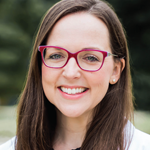 Ann Marie Szymanski, MD, FAAP, a clinical research fellow at the National Institutes of Health, Bethesda, Md., says, “The ACR doesn’t just focus on researchers or clinicians. It takes a holistic approach by looking at the whole spectrum of healthcare providers and really puts an emphasis on the importance of the different team members and how everybody’s input is important.”
Ann Marie Szymanski, MD, FAAP, a clinical research fellow at the National Institutes of Health, Bethesda, Md., says, “The ACR doesn’t just focus on researchers or clinicians. It takes a holistic approach by looking at the whole spectrum of healthcare providers and really puts an emphasis on the importance of the different team members and how everybody’s input is important.”
As a pediatric resident at Children’s National Health System, Washington, D.C., in 2015, Dr. Szymanski worked closely with the pediatric rheumatology team and encountered several interesting cases that attracted her to rheumatology. That experience encouraged her to participate in a joint program—a pediatric rheumatology fellowship—run by the Children’s National Health System and the National Institutes of Health (NIH), which she completed in 2018.
Now she is exploring research opportunities at NIAMS within the NIH. Under the mentorship of Michael Ombrello, MD, head of Translational Genetics and Genomics Unit at NIAMS, her focus is on the pathogenesis of systemic JIA. Recently, she participated in research that implicated variants of the IL-1RN genetic locus in systemic JIA susceptibility and response to therapy.
She also developed a natural history protocol that studies systemic JIA, adult-onset Still’s disease and related inflammatory conditions. The approved protocol investigates these conditions in detail, characterizes the phenotypic evolution of patients over time and better defines the relationship between genetics and disparate aspects of disease.
“I like taking care of chronic patients over time,” says Dr. Szymanski, who graduated in 2012 from the University of Miami Miller School of Medicine, Fla. “That’s partly why I went into pediatrics. With rheumatology, you get that continuity; you can monitor [patients] and, hopefully, see them improve and watch them grow.”
She adds that the positive attitude of her patients and their parents when confronted by devastating news about the consequences of a disease has spilled over into her personal life. She tries to build on their resiliency, which has changed her own perceptions and outlook.
The ACR has elected Dr. Szymanski, who has an undergraduate language and literature degree from the University of Notre Dame, South Bend, Ind., to serve the development team, specifically the literature review committee, of the upcoming juvenile idiopathic arthritis guideline, which will include treatment recommendations for non-systemic polyarthritis, sacroiliitis and enthesitis, as well as uveitis.
“I’m not sure where the future will take me right now, but I am excited to develop new relationships with other researchers and clinicians from around the world,” says Dr. Szymanski. “I feel fortunate that patients trust me to take care of them and become an important member in their lives.”
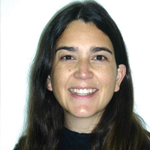 Antonia Valenzuela, MD, MS, is a clinical assistant professor in the Clinical Immunology & Rheumatology Division of Pontificia Universidad Católica de Chile, Santiago, Chile. She says, “The ACR has been fundamental in shaping my career and choices throughout my career. I have been participating in the ACR/ARHP Annual Meetings since 2013, which has provided me with opportunities to present my work and network with outstanding rheumatologists from all over the world who can impact my career.”
Antonia Valenzuela, MD, MS, is a clinical assistant professor in the Clinical Immunology & Rheumatology Division of Pontificia Universidad Católica de Chile, Santiago, Chile. She says, “The ACR has been fundamental in shaping my career and choices throughout my career. I have been participating in the ACR/ARHP Annual Meetings since 2013, which has provided me with opportunities to present my work and network with outstanding rheumatologists from all over the world who can impact my career.”
Dr. Valenzuela was drawn to rheumatology in part because of the opportunities that exist to establish long-term relationships with patients who have chronic diseases.
After graduating medical school in 2007 and completing her residency in internal medicine at Universidad de Chile, she focused on scleroderma. Her research concentrated on the study of calcinosis in autoimmune connective tissue disease with an emphasis in calcinosis in systemic sclerosis.
In 2013, she obtained a Master of Science in epidemiology and clinical research from the Department of Health Research and Policy at Stanford University, Palo Alto, Calif. During the next three years, she was a postdoctoral research fellow at Stanford’s Immunology and Rheumatology Division, working closely with Lorinda Chung, MD, MS, associate professor of medicine, immunology and rheumatology and dermatology, Stanford School of Medicine. She also did a clinical rheumatology fellowship at Stanford from 2016–2018.
Dr. Valenzuela has been instrumental in obtaining funding from the Scleroderma Clinical Trials Consortium to conduct a multicenter study that is building a longitudinal cohort of patients with calcinosis and systemic sclerosis to investigate the natural history of and potential associated risk factors for this complication. She also designed and coordinated a clinical trial for calcinosis in patients with scleroderma.
Under the mentorship of Dr. Chung, Dr. Valenzuela served as first author for multiple studies, wrote review articles, contributed to book chapters and presented multiple oral presentations at meetings worldwide. During her clinical fellowship over the past two years, she helped develop a rheumatologist satisfaction questionnaire and is now working on developing a patient satisfaction scale. During her postdoctoral research fellowship, she was a teaching assistant for multiple, master-level courses in epidemiology.
Dr. Valenzuela has achieved many accomplishments during her early career so it’s not surprising that her colleagues and patients describe her as a hard worker, passionate, resourceful, thoughtful and, just as important, optimistic.
Now, Dr. Valenzuela is practicing, researching and teaching medicine in Santiago, her hometown. She moved back because there were only 173 rheumatologists in Chile in 2016, she says, and few of them were dedicated to research.
“Being a healthcare provider has taught me that I can learn from every patient, every human interaction,” says Dr. Valenzuela. “It’s also taught me that I enjoy teamwork and that you really need to interact with your patients and peers to provide better healthcare.”
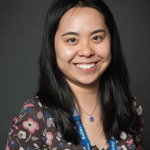 Shudan Wang, MD, is an assistant professor at Montefiore/Albert Einstein College of Medicine, The Bronx, N.Y. She says, “The ACR is a great platform for young rheumatologists, especially those who are trying to establish a research career. I am able to present my posters, talk to different people and come up with different research questions. It’s quite inspiring to have this platform to share ideas.”
Shudan Wang, MD, is an assistant professor at Montefiore/Albert Einstein College of Medicine, The Bronx, N.Y. She says, “The ACR is a great platform for young rheumatologists, especially those who are trying to establish a research career. I am able to present my posters, talk to different people and come up with different research questions. It’s quite inspiring to have this platform to share ideas.”
Dr. Wang perceives herself as a global citizen. She was born in Chengdu, China, and lived in Finland and Canada before moving to the U.S., where she earned her medical degree from Rutgers New Jersey Medical School, Newark, in 2013. During medical school, she was inducted into the Gold Humanism Honor Society and received the Dean’s Academic Excellence Scholarship.
In 2016, she completed her residency in internal medicine at New York Presbyterian Hospital-Cornell. Two years later, she finished her rheumatology fellowship at New York University (NYU) School of Medicine, where she pursued her passion for clinical/translational research.
She also served as fellowship wellness coordinator for her class and chief fellow for quality improvement, leading projects to improve the treat-to-target approach in rheumatoid arthritis and increase screening rates for postmenopausal osteoporosis.
Dr. Wang’s interest in the role of the complement system in lupus nephritis was inspired by a refractory lupus nephritis patient who received eculizumab. Under the mentorship of H. Michael Belmont, MD, clinical assistant professor of medicine, NYU School of Medicine, she investigated the significance of terminal co0mplement deposition in lupus nephritis. They observed that lupus patients whose renal biopsies showed immunohistochemical staining for C9 were more likely to have hypertension and poorer clinical response to treatment, implicating a role for terminal complement in lupus kidney damage.
This led them to submit two proposals to investigate the efficacy of eculizumab in lupus nephritis. As a fellow, she also published a report of myelodysplastic syndrome presenting as Behçet’s disease.
Currently, Dr. Wang is working with Michael Pillinger, MD, professor of medicine and professor of biochemistry and molecular pharmacology, NYU School of Medicine, and Kamil E. Barbour, PhD, MPH, an epidemiologist with the Arthritis Program, Centers for Disease Control and Prevention, Atlanta. They are investigating the relationship between asymptomatic hyperuricemia and knee osteoarthritis using NHANES III. Dr. Wang found that hyperuricemia is associated with knee OA risk in non-obese adults.
Dr. Wang’s work was presented at the 2017 and 2018 ACR/ARHP Annual Meetings and the Rheumatology Research Workshop in 2018.
Dr. Wang also teaches at the Lupus Clinic at Montefiore and is working with Chaim Putterman, MD, professor, Department of Medicine, Department of Microbiology & Immunology, and chief, Division of Rheumatology, Department of Medicine, Albert Einstein College of Medicine, on a clinical trial investigating the efficacy of Bruton’s tyrosine kinase inhibition in SLE.
“Because I’m now working at a new place, I will be working on another project,” says Dr. Wang, whose twin sister, Shu Wei Wang, MD, is also a rheumatologist. “I see a lot of lupus patients. I hope to continue my research in lupus while at Montefiore.”
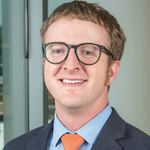 Patrick R. Wood, MD, is an assistant professor in the Division of Rheumatology at the University of Colorado, Aurora. He says, “Rheumatology is a small field. The ACR allows us to have a global community in terms of scholarship, service and advocacy. It’s a most valuable service.”
Patrick R. Wood, MD, is an assistant professor in the Division of Rheumatology at the University of Colorado, Aurora. He says, “Rheumatology is a small field. The ACR allows us to have a global community in terms of scholarship, service and advocacy. It’s a most valuable service.”
As a rheumatologist, Dr. Wood primarily focuses on innovative, patient-centered, clinical care and medical education. He pioneered the use of telemedicine in rheumatology at his institution, which has improved access, convenience and travel costs for rheumatic disease patients in a mostly rural and underserved region.
“The biggest challenge was creating the logistical infrastructure for something that’s new and coordinating between multiple facilities and multiple institutions in providing a new service,” he says. His efforts have been documented in program evaluation manuscripts, abstracts and presentations. His quality improvement papers have since been published on the Journal of Clinical Rheumatology’s website.
Dr. Wood obtained his medical degree in 2011 from the University of Washington, Seattle. His internal medicine residency was completed in 2014 at the University of Colorado, Denver, where he was inspired to pursue a rheumatology career through his clinical work and research with division faculty that included local rheumatologists, Robert Janson, MD, and Kevin Deane, MD, PhD. After serving as an instructor in hospital medicine at the University of Colorado, he completed a three-year academic track for his fellowship training in 2018 and then joined the university’s faculty.
During his rheumatology fellowship, Dr. Wood’s mentor was Liron Caplan, MD, PhD, section chief for rheumatology, Denver Veterans Affairs Medical Center, and staff physician, University of Colorado Hospital. Dr. Wood obtained graduate training in public health and biostatistics, while publishing manuscripts related to medication safety, adverse drug effects, and health literacy. During his final fellowship year, he also was chosen as one of two fellows to participate in the school’s clinician-educator fellow development program.
During the past two years, he taught the undergraduate medical student immunology course and participated in local and national educational programs, such as writing for the ACR’s Continuing Assessment Review Evaluation (CARE) program. His teaching has extended into the community, where he serves as the clinical director and a clinician-educator at the Rocky Mountain Regional VA Medical Center, Aurora, Colo.
His initiatives surrounding rural care delivery for inflammatory arthritis were recognized by the U.S. Department of Veterans Affairs. Through the VA’s Center of Innovation Program, he received a competitive funding award.
“I hope to primarily work on cutting-edge patient care delivery along with education and innovative educational projects,” says Dr. Wood. “I hope to spread knowledge about rheumatic disease management to those even who aren’t going to be rheumatologists because there won’t be enough rheumatologists in the coming years.”
Carol Patton is a freelance writer based in Las Vegas.
Keri Losavio is the editor of The Rheumatologist, a position she has held since 2014.



